
How to Have a Sustainable Picnic
More Good Stories
Kashiwa Craft: Shaped by Hand, Guided by Nature
Miyuki and Hisato Iwatsuki on carrying Seto’s legacy forward with warmth.
The Black Friday Sale: 20-65% off. Shop Now
US & Canada: Duties and customs are on us— nothing more for you to pay.
Free Carbon-Offset Shipping on orders from $175 USD. Exclusions Apply.
An eco-friendly picnic in Paris featuring sustainable dining options.
Words by Rudri Bhatt Patel
Photography by Celia Spenard-Ko
Enjoy al fresco dining while also thinking about the environment.
Words by Rudri Bhatt Patel
Photography by Celia Spenard-Ko
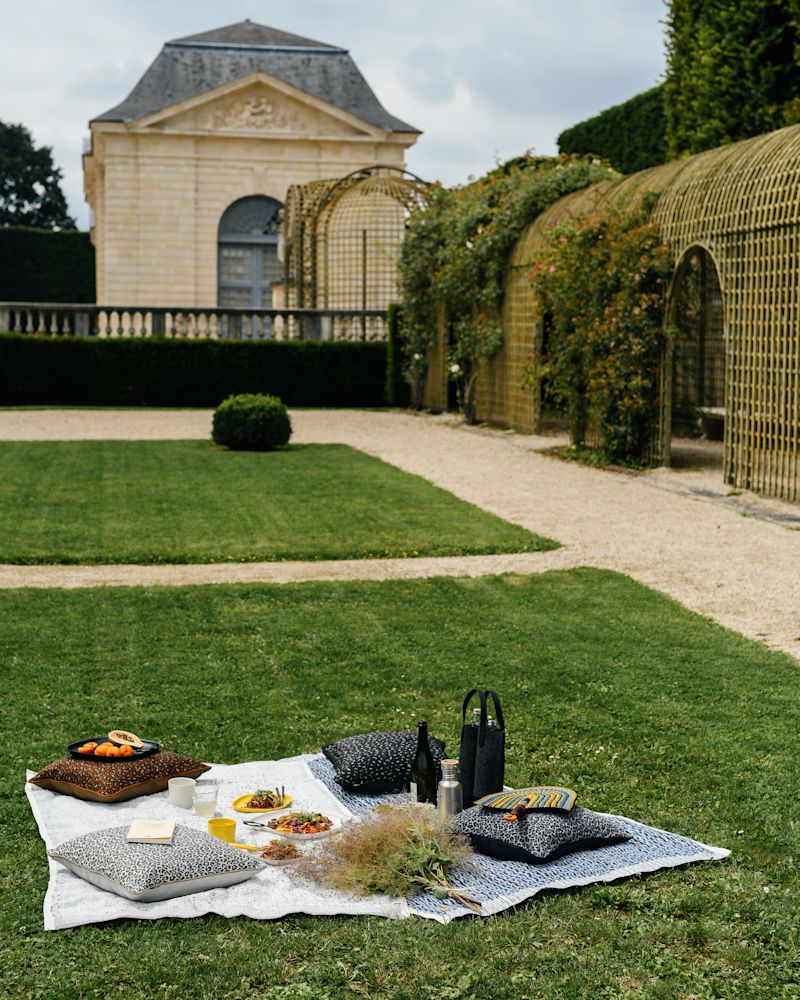
An eco-friendly picnic in Paris featuring sustainable dining options.
When you think about summer winding down, there is no better way to celebrate than an outdoor picnic. Whether you’re headed to your favorite spot on the beach or want to have a picnic in your local park, you can enjoy the outdoors with your favorite sandwich, bond with family and friends, and maybe partake in some fun people watching.
Al fresco dining can have its obvious benefits — fresh air, a chance to feel free in the outdoors and play games with the family. However, there is a possibility that picnicking can have an adverse impact on Mother Nature. Here is the good news — there are several ways to enjoy picnic time and also show your respect to the earth.
Here are six tips to have a picnic that is not only fun, but sustainable too.
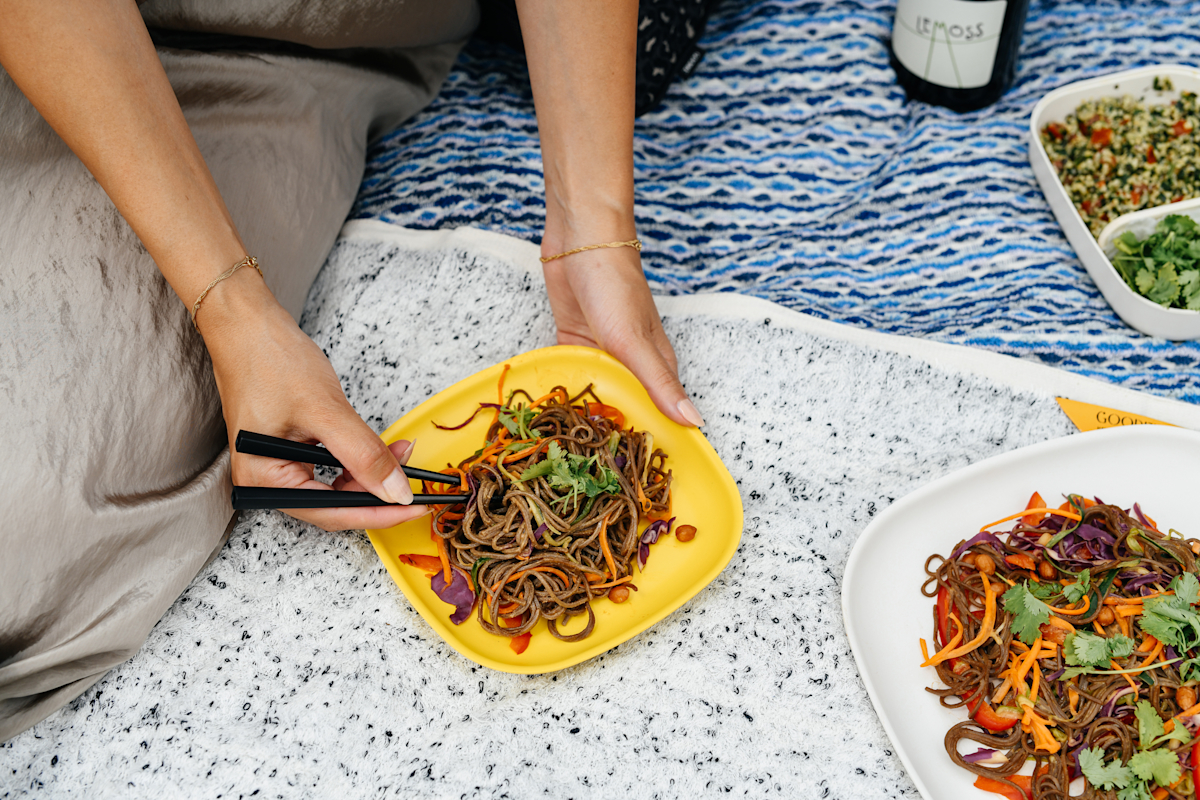
Use reusable utensils.
You’ve likely seen the images of waste swamps sitting in our oceans. This isn’t surprising, considering that 79 percent of plastic waste ends up in landfills, in our natural environment and in dumps. You can do your part in being a solution to this problem. The next time you decide to picnic, make certain you use reusable utensils — you can either grab forks, knives and spoons from home or invest in an Otherware set to reuse every time you decide to head out to picnic. The best way to cultivate a sustainable mindset is to have options readily available so you don’t forget or have to think about what to pack.
Choose to pack unprocessed foods.
You might be tempted to grab processed foods — chips, crackers or pre-boxed meals, to throw into your picnic basket. Most of these foods come in plastic or in boxes that are unrecycled and dumped in a landfill. For families, especially those with kids, a healthier option is to buy natural foods, like berries, oranges or bananas that you can store in reusable containers you can find at Ekobo. Or you can pack cucumbers and red bell peppers with hummus to meet your daily veggie requirement.
It’s a good idea to model sustainable behavior for your kids so that they see you using products that are reusable and non-toxic. The added bonus — these reusable containers come in fun colors, and kids are welcome to mix and match their favorites. And adults can pair their favorite bento box from Ekobo — a good way for kids to see adults getting on board the eco-friendly movement too!
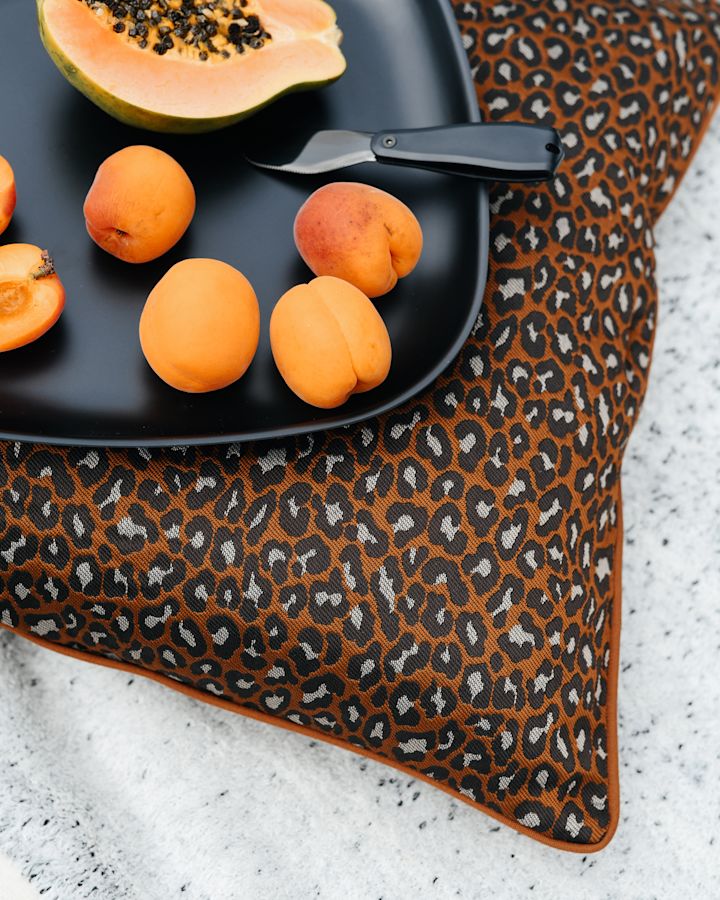
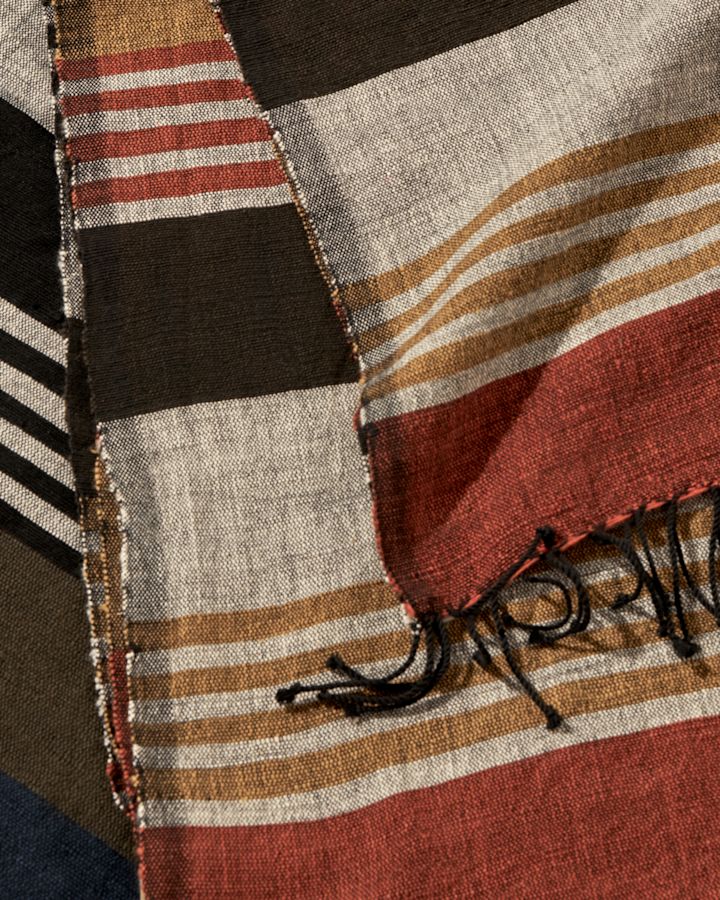
Our new GOODEE rPET Pillow. / Sabahar Nomad Throw.
Bring your own linens.
You might think it’s more convenient to purchase a disposable tablecloth from the grocery store to lay down on the ground. Ditch this old-school way of picnicking and add your own flair by bringing linens from home. Just because it’s an outdoor picnic doesn’t mean you have to skimp on ambiance. You can bring your own wine tote and coordinating tablecloth and napkins to create your own personalized picnic space.
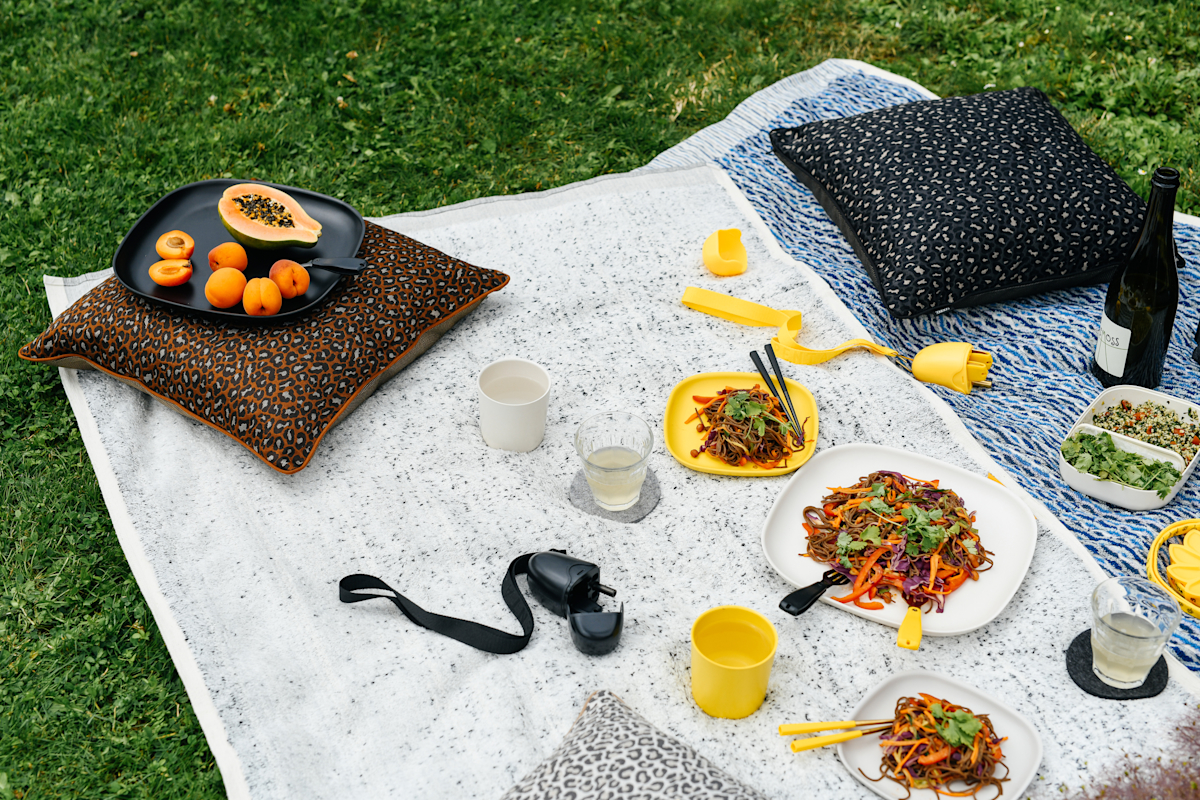
An eco-friendly picnic spread featuring outdoor dining essentials.
Scout out a location that is local and nearby.
Instead of finding a location where you have to jump in the car, make it a complete outdoor experience by biking to your picnic spot. Don’t worry about not having enough room to pack all your goodies. You can attach a fun picnic basket from Baba Tree to the front of your bike. Make it adventurous for your family by adding a scavenger hunt in your picnic ride or having mini-bike races to the location. Reducing your carbon footprint can be an enjoyable way for your entire family to bond and while educating your children on why you’re choosing an alternate form of transportation.
Go plant-based during your picnic.
Take meatless Mondays to the next level and go plant-based for your picnic. It is estimated that the livestock industry produces 1.4 billions pounds of waste in one year. Making an eco-friendly meal means you can buy local produce and support businesses in your area. Another upside? You can use discarded vegetables and fruit peelings for composting. By going plant-based during your picnic you’re taking sustainability to the next level.
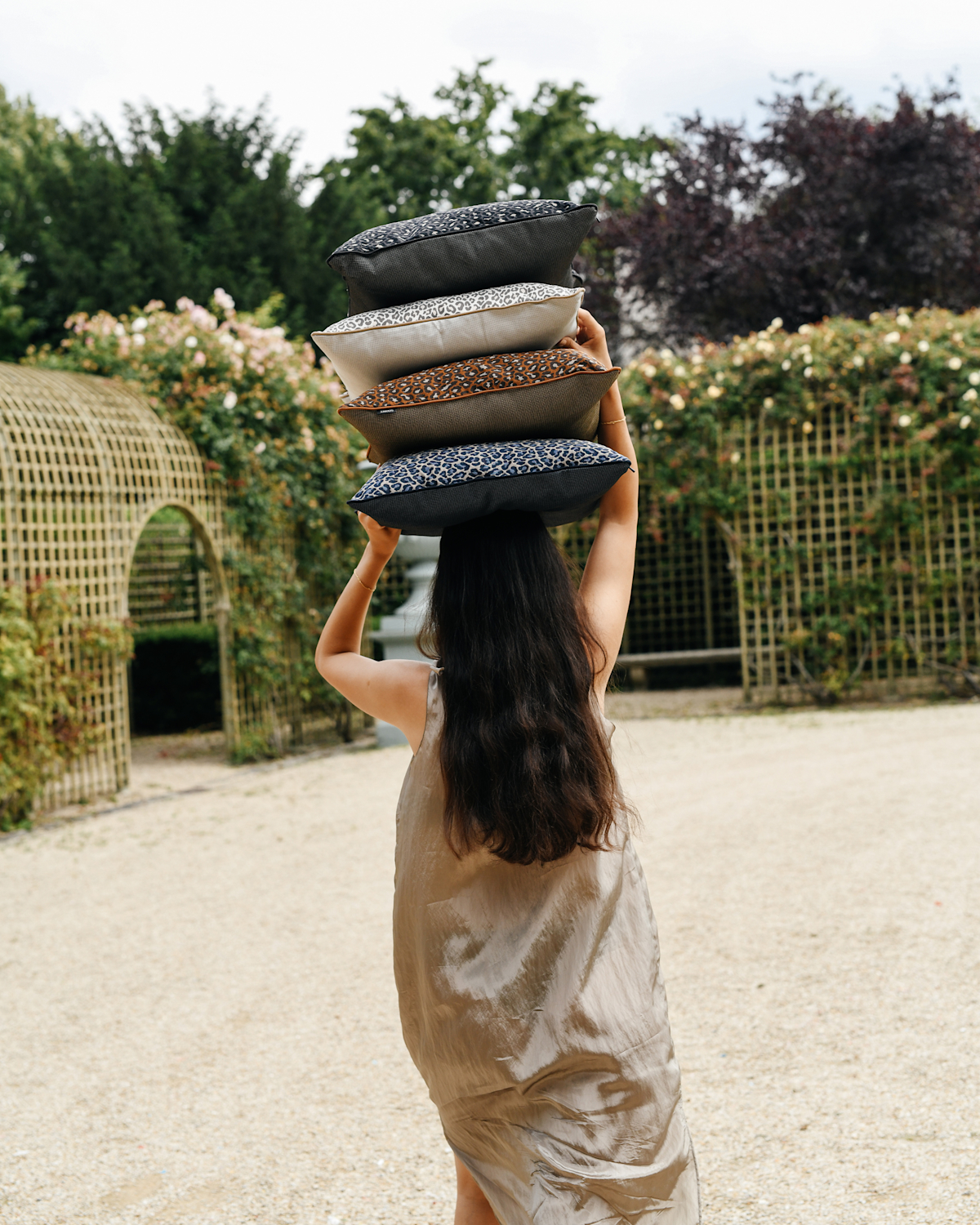
The GOODEE rPET Jacquard Pillows.
Plan ahead for clean-up.
The last thing you want to do after your leisurely picnic is to forget about clean-up. Make certain you pick up any trash and put it in your biodegradable trash bag. Most picnic sites also have separate bins for recyclables, compost and the landfill. It’s also a valuable lesson for kids to learn responsible clean-up. You can have a positive impact on your family and community while working together for a common goal.

Rudri Bhatt Patel is a former attorney turned writer, editor and instructor. Prior to attending law school, she graduated with an MA in English with an emphasis in creative writing. She is the co-founder and co-editor of the literary journal, The Sunlight Press, and her work has appeared in The Washington Post, Business Insider, Civil Eats, Saveur, Dame Magazine, ESPN, Phoenix New Times, and elsewhere. Find more of work at www.rudribhattpatel.com.
Miyuki and Hisato Iwatsuki on carrying Seto’s legacy forward with warmth.
All our orders are shipped with carbon off-set shipping.
Get access to exclusive discounts and products for all your projects.
Find the perfect gift for your loved one with our curated options.
Create your perfect registry and get gifts you will love.



